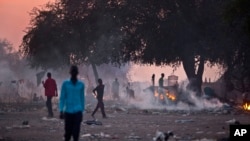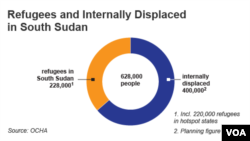The number of South Sudanese who have been forced to flee their homes as violence continues to rake the young country could double from 200,000 to 400,000 in the space of a few days if the country's leaders are unable to reach a peace deal, United Nations officials warned Thursday.
"We could well have 300,000 or 400,000 people who are displaced in a matter of days" unless the fighting that began in the capital 18 days ago and quickly spread around the country ends, Toby Lanzer, the U.N. Humanitarian Coordinator in South Sudan, told VOA News.
Even as delegates representing President Salva Kiir and his rival, former Vice President Riek Machar, gathered in the Ethiopian capital for peace talks, the U.N. High Commissioner for Refugees (UNHCR) said the number of people who have been displaced by the violence has risen from 180,000 two days ago to more than 200,000 on Thursday.
Around 10,000 people have fled to neighboring countries, with Ethiopia and Uganda taking in the overwhelming majority of South Sudanese refugees, the UNHCR said.
Within South Sudan, 75,000 people have sought refuge from days of fighting in Bor, the capital of Jonglei state, 50 kilometers away in Awerial in Lakes State, Lanzer said.
Lanzer said tens of thousands have also sought refuge at churches and U.N. facilities in Bor, Malakal in Upper Nile state, Bentiu in Unity state and Juba. Fighting has rocked all four cities since the unrest began on Dec. 15, although calm was said to have been restored in the capital.
Among those who have sought refuge at the U.N. bases were "a considerable number of foreign nationals," mostly from neighboring countries but also Australians, Americans, Britons and Canadians, Lanzer said.
With the crisis continuing to grow, the U.N. has called for more funding to meet the needs of people displaced by the violence in South Sudan, and the needs of another 210,000 refugees who fled violence in neighboring Sudan and live in U.N.-run camps, mainly in the north of South Sudan.
"These are people who fled from Sudan where there was violence and came to South Sudan to seek safe haven. As a refugee said to me, 'I left violence, I came here, I found violence. Where do I go?'" Lanzer said.
The U.N. has asked for a total of $209 million to allow it to protect and aid people in need in South Sudan over the next three months, Lanzer said.
South Sudan plunged into violence nearly three weeks ago when soldiers opened fire in Juba after a meeting of the ruling Sudan People's Liberation Movement (SPLM). Kiir said the unrest was triggered by a coup bid orchestrated by Machar, a claim the former vice president has denied.
The U.N. says at least 1,000 people have died in the fighting, which rapidly spread to other parts of the country and took on ethnic overtones, pitting members of Kiir's ethnic group, the Dinka, against members of Machar's Nuer ethnic group.
In a statement released Tuesday, the U.N. Mission in South Sudan (UNMISS) said it has "mounting evidence" that serious human rights abuses, including targeted ethnic killings, have been committed in the world's newest nation since the violence began.
"We could well have 300,000 or 400,000 people who are displaced in a matter of days" unless the fighting that began in the capital 18 days ago and quickly spread around the country ends, Toby Lanzer, the U.N. Humanitarian Coordinator in South Sudan, told VOA News.
Even as delegates representing President Salva Kiir and his rival, former Vice President Riek Machar, gathered in the Ethiopian capital for peace talks, the U.N. High Commissioner for Refugees (UNHCR) said the number of people who have been displaced by the violence has risen from 180,000 two days ago to more than 200,000 on Thursday.
Around 10,000 people have fled to neighboring countries, with Ethiopia and Uganda taking in the overwhelming majority of South Sudanese refugees, the UNHCR said.
Within South Sudan, 75,000 people have sought refuge from days of fighting in Bor, the capital of Jonglei state, 50 kilometers away in Awerial in Lakes State, Lanzer said.
Lanzer said tens of thousands have also sought refuge at churches and U.N. facilities in Bor, Malakal in Upper Nile state, Bentiu in Unity state and Juba. Fighting has rocked all four cities since the unrest began on Dec. 15, although calm was said to have been restored in the capital.
Among those who have sought refuge at the U.N. bases were "a considerable number of foreign nationals," mostly from neighboring countries but also Australians, Americans, Britons and Canadians, Lanzer said.
With the crisis continuing to grow, the U.N. has called for more funding to meet the needs of people displaced by the violence in South Sudan, and the needs of another 210,000 refugees who fled violence in neighboring Sudan and live in U.N.-run camps, mainly in the north of South Sudan.
"These are people who fled from Sudan where there was violence and came to South Sudan to seek safe haven. As a refugee said to me, 'I left violence, I came here, I found violence. Where do I go?'" Lanzer said.
The U.N. has asked for a total of $209 million to allow it to protect and aid people in need in South Sudan over the next three months, Lanzer said.
South Sudan plunged into violence nearly three weeks ago when soldiers opened fire in Juba after a meeting of the ruling Sudan People's Liberation Movement (SPLM). Kiir said the unrest was triggered by a coup bid orchestrated by Machar, a claim the former vice president has denied.
The U.N. says at least 1,000 people have died in the fighting, which rapidly spread to other parts of the country and took on ethnic overtones, pitting members of Kiir's ethnic group, the Dinka, against members of Machar's Nuer ethnic group.
In a statement released Tuesday, the U.N. Mission in South Sudan (UNMISS) said it has "mounting evidence" that serious human rights abuses, including targeted ethnic killings, have been committed in the world's newest nation since the violence began.






